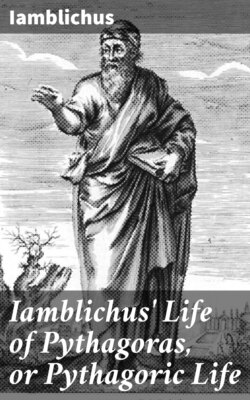Читать книгу Iamblichus' Life of Pythagoras, or Pythagoric Life - Iamblichus - Страница 10
На сайте Литреса книга снята с продажи.
CHAP. VI.
ОглавлениеTable of Contents
And these indeed were such as philosophized. But the greatest part of his disciples consisted of auditors whom they call Acusmatici, who on his first arrival in Italy, according to Nicomachus, being captivated by one popular oration alone, exceeded two thousand in number. These, with their wives and children, being collected into one very large and common auditory, called Homacoïon, and which for its magnitude resembled a city, founded a place which was universally called Magna Græcia. This great multitude of people likewise, receiving laws and mandates from Pythagoras as so many divine precepts, and without which they engaged in no occupation, dwelt together with the greatest general concord, celebrated and ranked by their neighbours among the number of the blessed. At the same time, as we have already observed, they shared their possessions in common. Such also was their reverence for Pythagoras, that they numbered him with the Gods, as a certain beneficent and most philanthropic dæmon. And some indeed celebrated him as the Pythian, but others as the Hyperborean Apollo. Some again considered him as Pæon, but others as one of the dæmons that inhabit the moon; and others celebrated him as one of the Olympian Gods,[11] who, in order to benefit and correct the mortal life, appeared to the men of those times in a human form, in order that he might extend to them the salutary light of felicity and philosophy. And indeed a greater good never came, nor ever will come to mankind, than that which was imparted by the Gods through this Pythagoras. Hence, even now the proverb of the long-haired Samian, is applied to the most venerable man. But Aristotle relates, in his Treatise On the Pythagoric Philosophy, that such a division as the following was preserved by the Pythagoreans among their principal arcana; viz. that of rational animals one kind is a God, another man, and another such as Pythagoras. And indeed they very reasonably apprehended him to be a being of this kind, through whom a right conception and conformable to things themselves was introduced of Gods, heroes, and dæmons; of the world, the all-various motion of the spheres and stars, their oppositions, eclipses, and inequalities, their eccentricities and epicycles; of all the natures contained in the heavens and the earth, together with those that have an intermediate subsistence, whether apparent or occult. Nor was there anything (in all this variety of information) at all contrary to the phenomena, or the conceptions of intellect. To which we may add, that all such disciplines, theories, and scientific investigations, as truly invigorate the eye of the soul, and purify the intellect from the blindness introduced by studies of a different kind, so as to enable it to perceive the true principles and causes of the universe, were unfolded by Pythagoras to the Greeks. But besides all this, the best polity, popular concord, community of possessions among friends, the worship of the gods, piety to the dead, legislation, erudition, silence, abstinence from animals, continence, temperance, sagacity, divinity, and in one word, whatever is anxiously sought after by the lovers of learning, was brought to light by Pythagoras. On all these accounts, therefore, as I have just now said, he was (every where) so transcendently admired.
